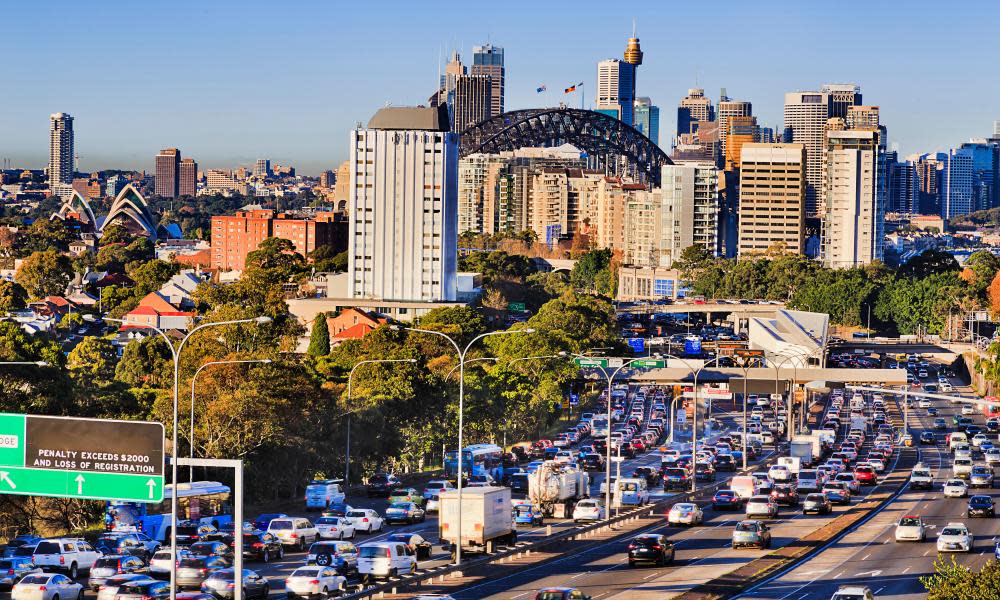Dominic Perrottet rules out Sydney congestion tax after confidential plans leaked

Researchers say the major road transport reform should not be ruled out so quickly as city faces growing gridlock
The New South Wales premier, Dominic Perrottet, says his government will not introduce a congestion charge but researchers are calling for the major road transport reform not to be ruled out so quickly.
“There is no plan for a congestion tax and and we can rule it out completely,” he told reporters on Wednesday.
The proposal to introduce a London-style congestion charge in Sydney was revealed in leaked cabinet documents obtained by Nine newspapers and was among several plans to reform how the state manages its road network.
Under the plan charges would be applied to drivers who enter a 20 sq km area around inner-city Sydney or would be imposed at certain times to reshape how and when people travel.
Related: Apartment dwellers face hurdles in the race to install EV chargers
A similar charge was introduced in London in 2003 where drivers paid roughly $25 to enter the city centre.
The leaked cabinet documents also contained plans to lower speed limits on inner-city streets to 30km/h and reconsider regional speeds, and to change the cost of public transport which has been subsidised.
Speaking to reporters on Wednesday, Perrottet said “there was no plan for a congestion tax and we can rule it out completely”.
However, Marion Terrill from the Grattan Institute said the government should not be so quick to rule out the idea.
Terrill said the pandemic had pushed people away from public transport and the introduction of electric vehicles meant driving would become less expensive which could result in more car journeys – and more congestion.
“Sydney is already quite a car-dependent city,” Terrill said. “A congestion charge is a politically difficult reform but it does tackle head-on the problem of congestion that does have costs for people.
“It encourages people to take their trips at a quieter time of day, or get on the bike or walk if that makes sense for the particular trip they are doing.
“I would hope it doesn’t get ruled out immediately for lack of political courage it takes to come up with an idea like this and it is given serious consideration.”
Terrill said past research showed those in higher income brackets drove the most and the longest, while public transport connected working class people in outlying areas directly to the CBD.
New research published by the Australian National University on Wednesday found Australia would fail to meet both its 2030 and 2050 emissions reduction targets if it continued to lag on electrifying its road transport fleet.
Left unchecked road transport emissions would represent more than half Australia’s total emissions by 2030.
Email: sign up for our daily morning briefing newsletter
App: download the free app and never miss the biggest stories, or get our weekend edition for a curated selection of the week's best stories
Social: follow us on YouTube, Facebook, Instagram, Twitter or TikTok
Podcast: listen to our daily episodes on Apple Podcasts, Spotify or search "Full Story" in your favourite app
The Western Australian state government announced a $60m electric vehicle package on Tuesday ahead of delivering the state budget.
Electric vehicle drivers in WA will be able to claim a $3,500 rebate on the purchase of an electric or hydrogen vehicle valued up to $70,000 from 10 May – the most generous subsidy in the country.
The Clean Energy Car Fund will include $36.5m to provide rebates for the first 10,000 EV drivers in the state and $22.6m will be set aside for the construction of new charging infrastructure across WA.
Western Australia will also introduce an electric vehicle user charge with the charge expected to come into force from 1 July 2027 at a base rate of 2.5 cents a kilometre for electric and hydrogen vehicles, and 2 cents a kilometre for plug-in hybrid electric vehicles. These rates will rise with inflation.
Related: Anthony Albanese pledges to lower cost of PBS medicines and boost EVs at Labor campaign launch
Behyad Jafari from the Electric Vehicle Council said the policy was a “positive” development but “holistic” reform for the road transport system was needed not just in Western Australia but around the country.
“What we see in WA is they’re doing some great immediate things, they have this longer term plan for chargers, but in between the now and the then, we need to ask what else we can fix as well,” Jafari said.
“We know that pollution has an impact on emissions and public health where that cost right now gets passed on to the taxpayer through the health system.
“As we look at things like the congestion charges, like the need to charge people for emissions coming out of their vehicles, an EV charge doesn’t do these things.
“We need to have this more evolved discussion about how we pay for our roads in a way that improves emissions.”

 Yahoo News
Yahoo News 
